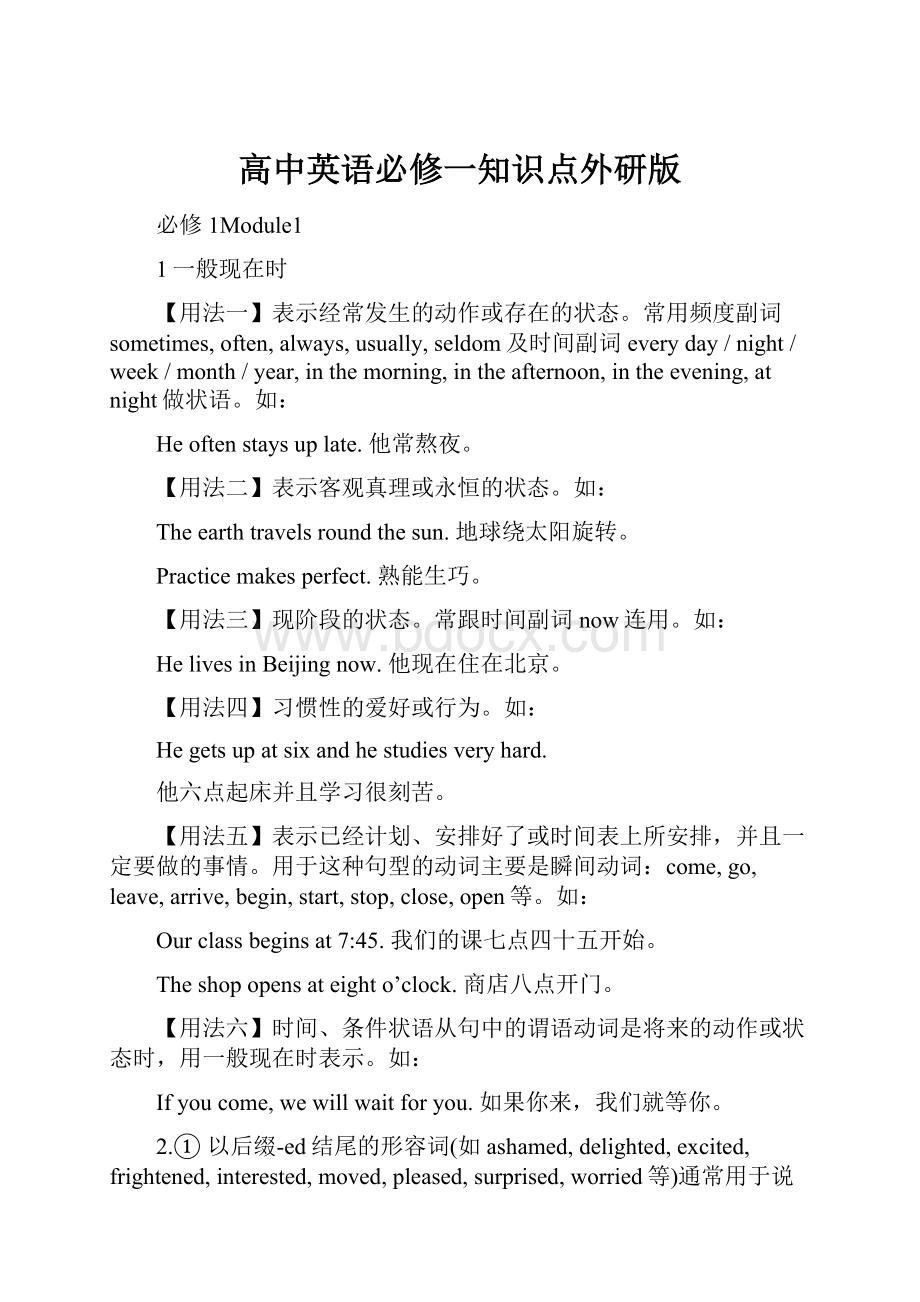高中英语必修一知识点外研版.docx
《高中英语必修一知识点外研版.docx》由会员分享,可在线阅读,更多相关《高中英语必修一知识点外研版.docx(32页珍藏版)》请在冰豆网上搜索。

高中英语必修一知识点外研版
必修1Module1
1一般现在时
【用法一】表示经常发生的动作或存在的状态。
常用频度副词sometimes,often,always,usually,seldom及时间副词everyday/night/week/month/year,inthemorning,intheafternoon,intheevening,atnight做状语。
如:
Heoftenstaysuplate.他常熬夜。
【用法二】表示客观真理或永恒的状态。
如:
Theearthtravelsroundthesun.地球绕太阳旋转。
Practicemakesperfect.熟能生巧。
【用法三】现阶段的状态。
常跟时间副词now连用。
如:
HelivesinBeijingnow.他现在住在北京。
【用法四】习惯性的爱好或行为。
如:
Hegetsupatsixandhestudiesveryhard.
他六点起床并且学习很刻苦。
【用法五】表示已经计划、安排好了或时间表上所安排,并且一定要做的事情。
用于这种句型的动词主要是瞬间动词:
come,go,leave,arrive,begin,start,stop,close,open等。
如:
Ourclassbeginsat7:
45.我们的课七点四十五开始。
Theshopopensateighto’clock.商店八点开门。
【用法六】时间、条件状语从句中的谓语动词是将来的动作或状态时,用一般现在时表示。
如:
Ifyoucome,wewillwaitforyou.如果你来,我们就等你。
2.①以后缀-ed结尾的形容词(如ashamed,delighted,excited,frightened,interested,moved,pleased,surprised,worried等)通常用于说明人,不用于说明事物,即使它们所修饰的名词是事物,那它们指的也是与该事物相关的人。
如:
Hehadapleasedsmileonhisface.
他脸上露出了满意的微笑。
Hetoldmethenewsinaveryexcitedvoice.
他告诉了我这个消息,声音很激动。
-ed形容词通常直接用于说明人,若修饰事物,则多为air(神态),appearance(外貌),cry(哭声),face(表情),voice(声音),mood(情绪)等与显示某人的情感状况的名词。
②以后缀-ing结尾的形容词(如exciting,frightening,interesting,moving,surprising,worrying等)主要用于说明事物,表示事物的性质或特征,若用它们说明人,则表示此人具有此性质或特征。
如;
Thestoryisveryinteresting.
这个故事很有趣。
Themanisveryinteresting.这个人很有趣。
⒊Secondaryschoolyearisdividedintotwosemesters,thefirstofwhichisSeptemberthroughDecember,andthesecondJanuarythroughMay.
⑴关系代词which引导了一个定语从句,指代前面句子中的twosemesters。
模仿造句:
①.我有两辆自行车,其中一辆是红色的。
Ihavetwobikes,oneofwhichisred.
②.史密斯先生有两个儿子,其中一个是医生。
Mr.Smithhastwosons,oneofwhomisadoctor.
⑵divide
divide“分割,分成”指将一个整体分成几个部分。
dividesthinto…..
separate“使分离,使分开”,指使靠在或混合在一起的东西分开。
separateAfromB
①.Wedividedtheappleintohalves.(把一个苹果切成两半)
②.Weseparatedgoodapplesfromtherottenones.(把好苹果和坏苹果分开)
③.Heseparatedthetwofightingboys.(他把两个正打成一团的两个男孩分开了。
)
④.15dividedby5makes3.
⑤.Wehadadiscussionabouttheproblem,andopinionsaredivided.
⒋SohaveI.我也是。
(根据情况使用相应助动词,此处以助动词does为例)
1).表示“前面所说的情况也适应后者”时,其句型是:
so/neither/nor+助动词、情态动词、be+主语。
①.内容是肯定时,用so;内容是否定时,用neither或nor;
②.助动词、情态动词、be与前句中的保持一致;
③.助动词、情态动词、be的人称和数与其后的主语一致。
如,⑴.--Tomhopestobecomeadoctor.
--Sodoeshisbrother.
⑵.Bobwasn’tatschoolyesterday.NeitherwerePeterandTom.
⑶..Ifhegoesthere,sowillI.
2).能够区别“So+do+主语”与“So+主语+do”
⑴.--Heworkshard.
--Sohedoes,andsodoeshisbrother.他确实是这样,他兄弟也是如此。
⑵.—Heisanhonestboy.
--Soheis.确实是这样。
3).掌握“Soitis/waswith+宾语”或“Itis/wasthesamewith+宾语”,表示前面的情况(多指两种以上)适合于另一个人或事。
⑴.—Roseisastudentandworkshard.
---SoitiswithMike./ItisthesamewithMike.
⑵.—Tomlikesswimming,butdoesn’tlikefishing.
---SoitiswithJim.
⒌同位语---对前面的名词或代词进一步解释,由词、短语或从句充当。
ThisisTom,ourmonitor.
He,ourchemistryteacher,isaveryhumorousperson.
Imyselfwantedtosaythankstoyouforyourkindoffer.
Iwanttobuymymotherapresent,onethatisnotveryexpensivebutpractical.Areyoutwoready?
Theteachergaveuseachabook.
OurteachertoldusthenewsthatTomhadwonthefirstprizeinthecontest.
Icouldn’tbelievethenewsthatIwasallowedtoenterthekeyhighschool.
知识补充:
注意充当同位语的名词前冠词的用法。
试比较:
Tom,monitorofourclass,workshard.(√)
Tom,themonitorofourclass,workshard.(×)
HuJintao,chairmanofthePeople'sRepublicofChina,issupportedbyus.(√)
HuJintao,thechairmanofthePeople'sRepublicofChina,issupportedbyus.(×)
Tom,astudentinourclass,workshard.(√)
Tom,studentinourclass,workshard.(×)
总结:
表示职位,官职,官衔的名词充当同位语时,名词前面无冠词。
fact/truth/possibility/chance…that….
⑵farfrom①远离,离…远②毫不;远非;一点也不
⒍TheteacherisaveryenthusiasticwomancalledMsShen.
calledMs.Shen是过去分词短语作定语,与所修饰的词之间存在着逻辑上的被动关系,相当于定语从句who/thatwascalledMs.Shen。
(1).theguestsinvitedtotheparty受邀请参加派对的客人
(2).ThetextbookswrittenforteachingEnglish英语教科书
(3).被Tom打碎的杯子thecupbrokenbyTom
(4).三周前建成的图书馆thelibrarybuilt3weeksago
(5).我买的书thebookboughtbyme
⒎MsShen’smethodofteachingisnothinglikethatoftheteachersatmyJuniorHighschool.
⑴nothinglike一点也不像somethinglike有点像
⑵that此处为指示代词,指代上文中提到的单数名词或不可数名词。
例:
TheweatherofBeijingiscolderthanthatofNanjing.此处,that指代theweather
The hat you bought is bigger than that I bought.此处,that指代thehat.
1我买的书比他买的书贵。
Thebookboughtbymeismoreexpensivethanthatboughtbyhim.
②汤姆的行为和他哥哥的行为一点也不像。
Tom’sbehaviourisnothinglikethatofhisbrother
⒏否定前移及反义疑问句
Idon’tthinkIwillbeboredinMsShen’sclass!
(paragraph3thelastsentence)
1).结构:
I/wedon’tthink(believe/expect…)that…
第一人称发表观点的动词
①.我认为他不会来。
(think)
Idon’tthinkhewillcome.
②.我们觉得这个故事不是Jack写的。
(believe)
Wedon’tbelievethestorywaswrittenbyJack.
⒐Inotherwords,therearethreetimesasmanygirlsasboys.
话句话说,女生(人数)是男生的3倍。
as…as
◎Ais…(morethan)times-erthanB
theN.of=B’sN(size,length,width,depth,height,weight)
①.Thishospitalisfourtimesasbigasthatone.
=Thishospitalisthreetimesbiggerthanthatone.
=Thishospitalisfourtimesthesizeofthatone.
这所医院是那所医院的4倍大。
②.Thisroomishalfthesizeofthatone.
这个房间是那个房间的一半大。
⒑covervt.①覆盖②报道③涉及,包括④走(一段路程)
⑤占地⑥够支付…的费用
A翻译词组
becoveredwith覆盖着cover(adistanceof)5miles走了5公里
coveranareaof占地面积为coverthecostof够…的费用
B翻译句子
①Thecoursecoversallaspectsofbusinessandlaw.这本词典没有包括所有的英语单词。
②Bysunsetwehadcovered30miles.日落之前我们已经走了30英里。
③£10willcoverourpetrolforthejourney.10英镑足够支付我们旅行的汽油费用。
④.走出家门时,他发现地上覆满了白雪。
Whenhewalkedoutofthedoor,hefoundthegroundwascoveredwithsnow.
⑤.我们学校占地面积超过130亩。
Ourschoolcoversanareaofover130mu.
必修一Module2
1.⑴.wouldrather常用句型:
wouldratherdothando…//woulddoratherthando...//prefertodoratherthando…
我宁可在家看电视而不愿去看电影。
IwouldratherwatchTVathomethangotothecinema.
IwouldwatchTVathomeratherthangotothecinema.
IprefertowatchTVathomeratherthangotothecinema.
⑵.虚拟现象
A).wouldrather+(that)sb.+did(表示将来和现在)
sb.+haddone(表示过去的动作和状态)
我宁愿他明天付给我们那笔钱.
Iwouldratherhepaidusthemoneytomorrow.
B).如果不涉及别人只涉及主语本身则直接用
wouldratherhavedone(thandone)//wouldrathernothavedone
我真希望昨天晚上去看戏了而不是呆在家里.
Iwouldratherhavegonetothecinemathanstayedhomelastnight.
2.ThisistrueofFrance,Germany,andSpain----
Betrueof适用于------Eg:
Itistrueofeverybody.
①Britainhasrecently.hadahighlevelofunemployment,butthesameistrueofmanyothercountries.
②这儿的食物不错,服务也不错。
Thefoodisgoodandthesameistrueoftheservice.
⒊①Heisconsideringstudyingabroad.
考虑
②Weconsideredhissuggestionseriously.
consider
①Weconsiderhimasourclosefriend.
认为②Weconsiderthatheisourclosefriend.
③Weconsiderhimtobeourclosefriend.
④Heisconsideredtobe/asourclosefriend.
总结consider用法:
1.考虑:
considerdoing/n/that
2.认为:
consider---as/--(tobe)
beconsideredas/tobe
①我们认为边吃边说话是不礼貌的。
(considerit)
Weconsideritimpolitetotalkwhileeating.
②他们正在考虑在房价上升之前买那栋房子。
Theyareconsideringbuyingthehousebeforethepricesgoup.
③据说他在美国学习过。
HeissaidtohavestudiedinAmerica.
ItissaidthathestudiedinAmerica.
⒋①下列动词用动名词作宾语,请牢记下列口诀
考虑建议盼原谅,consider,suggest/advise,lookforwardto,excuse/pardon
承认推迟没得想。
admit,delay/putoff,fancy
避免错过继续练,avoid,miss,keep/keepon,practise
否认完成就欣赏。
deny,finish,enjoy/appreciate
禁止想象才冒险,forbid,imagine,risk
不禁介意准逃亡。
Can’thelp,mind,allow/permit,escape
②forgettodo忘记去做某事remembertodo记着要去做某事
doing忘记已经做过某事doing记得曾经做过某事
regrettodo遗憾去做某事stoptodo停下来去做另一件事
doingsth.后悔做过某事doing停止做某事
trydoingsth尝试做某事meandoingsth意味着做某事
todo努力/试图做某事todosth打算/想/企图做某事
goontodo接着做另一件事can’thelptodosth.不能帮助做某事
doing继续做同一件事doingsth.情不自禁做某事
③一些词或短语用主动形式表被动意义
need/want/require+doing/tobedone///be(well)worthdoing
Thehousewants/needs/requirestoberepaired.=Thehousewants/needs/requiresrepairing
这本书值得一读Thebookisworthreading
④动名词的语态和否定形式
主动语态:
doing被动语态:
beingdone否定形式:
notdoing
⑴Heescapedbeingcaught(catch)thistime.
⑵我不能忍受被别人那样对待.Ican’tstandbeingtreatedlikethat.
⑶Ithankyouverymuchforyournottelling(nottell)thesecrettoothers.
⒌①avoiddoing/②appreciatesth/doing
beingdoneitif/when…
③admitdoing/havingdone/beingdone④hatedoing/it
★hate,like,love,appreciate,dependon后面不能直接跟从句,要借助it,然后加从句。
⒍so…that句型
①so+形容词或副词+that...引导的肯定的结果状语从句,意思是“如此……以致于……”。
Herunssofastthatnobodycancatchupwithhim.
他跑得很快,没人能追上他。
②sothat用法:
sothat引导目的状语从句时,表示“以便;为了”,从句中常使用can/could/may/might/will/would/should等情态动词或助动词;
引导结果状语从句时,从句中一般不用情态动词,在sothat前可以用逗号,意思是“因此;所以”。
⑴我们起得这么早,为了赶上第一班火车
Wegotupearlysothatwecouldcatchthefirsttrain.
Wegotupearly(soas)tocatchthefirsttrain.
⑵我们起得这么早,结果赶上了第一班火车。
Wegotupearlysothatwecaughtthefirsttrain.
③such…that的句型结构可分以下三种:
1)such+a(an)+adj.+单数可数名词+that…clause
Heissuchacleverboythateverybodylikeshim.
翻译:
他是如此聪明的男孩,人人都喜欢他。
2)such+adj.+复数可数名词+that…clause
TheyaresuchinterestingnovelsthatIwanttoreadthemonceagain.
翻译:
他们是如此有趣的小说,以至于我想再读一遍
3)such+adj.+不可数名词+that…clause
Hehasmadesuchgreatprogressthattheteachersarepleasedwithhim.
翻译:
他取得了如此大的进步,老师们对他很满意。
【注意】
如果such后边的名词前由many、much、few、little等表示“多少”的词所修饰的话,则不用such而用so。
例如:
Hehadsomanyfallsthathewasblackandblueallover.
④So…/Such…that产生的倒装现象
【注意】:
只对that之前的主句部分进行倒装,助动词前移。
如,⑴Heransofastthatnoonecouldcatchupwithhim.
→Sofastdidherunthatnoonecouldcatchupwithhim.
⑵Itissofineadaythatwe